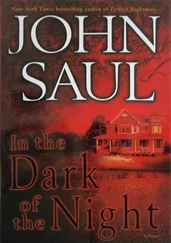“Maybe I could help you,” Pickering said. “Yes, of course. I’m just the one to help you.” He stood up and smoothed his green necktie. “I’ve been all over the Island. I’ve seen everything.”
Gabriel thrust the homemade knife into his belt. “If you help me, I’ll protect you. I’ll be your friend.”
Pickering’s lips quivered as he whispered to himself, “A friend. Yes, of course. A friend…” It sounded as if he were saying the word for the first time.
Something exploded in the city-a dull thumping noise-and Pickering began to scramble back up the slope. “With all due respect, sir-we can’t stay here. A patrol is coming. Very unpleasant. Please follow me.”
Pickering had called himself a “cockroach,” and he moved as quickly as an insect that had just been startled by a bright light. Entering one of the destroyed buildings, he passed through a maze of rooms filled with discarded furniture and piles of rubble. At one point, Gabriel realized that he had just stepped on some bones from a human skeleton. There was no time to figure out what had happened. “Watch your step, sir. But don’t stop. We can’t stop.” And Gabriel followed the thin man through a doorway and onto the street.
He was startled by the light that came from an enormous gas flare that roared up from a crack in the pavement. The orange flame wavered back and forth like a malevolent spirit. Smoke from this fire left a sticky black residue that covered the walls of the surrounding buildings as well as the shell of a smashed taxicab.
Gabriel stopped moving and stood in the middle of the street. Pickering reached the opposite sidewalk. He waggled his hands frantically like a mother coaxing her child forward. “A little faster, my friend. Please . A patrol is coming. We need to hide.”
“What patrol?” Gabriel asked, but Pickering had already disappeared through a doorway. The Traveler sprinted to catch up with his ragged guide and followed him through empty rooms to another street. He tried to imagine what the city had looked like before its destruction. The white buildings were four or five stories high, with flat roofs and balconies outside many of the windows. A twisted steel awning covered the broken tables of what had once been a sidewalk café. Gabriel had seen cities like this in movies and magazines. It resembled the provincial capital of a tropical country-the sort of place where people went to the beach during the day, then ate supper late in the evening.
Now every window had been smashed, and most of the doors had been ripped off their hinges. Attached by a few bolts, an elaborate iron balcony clung to the side of a building like a living creature trying not to fall into the street. Every wall was covered with graffiti. Gabriel saw numbers, names, and words written in block letters. Crudely drawn arrows pointed toward some unknown destination.
Pickering ducked inside a new building and began to move cautiously. A few times he stopped and listened, not moving until he was certain they were alone. Gabriel followed his guide up a marble staircase and down a hallway to a room where a half-burned mattress was leaning against the wall. Pickering pushed the mattress to one side, revealing a hidden doorway. They entered a room where the two windows were covered with plywood boards. The only light came from a small gas flare burning from a copper pipe that had been ripped out of the wall.
While Pickering pulled the burned mattress back across the doorway, Gabriel looked around the room. It was filled with trash that Pickering had collected during his explorations around the city. There were empty glass bottles, a stack of moldy blankets, a green easy chair with only two legs, and several cracked mirrors. Gabriel thought that the wallpaper was peeling; then he realized that Pickering had pinned up illustrations from a dress pattern book. The women in the faded drawings wore the floor-length skirts and high-necked blouses from a hundred years ago.
“Is this where you live?”
Pickering gazed at his drawings on the wall and spoke without a hint of irony. “I hope you find it comfortable, sir. My home sweet home.”
“Have you always lived in this building? Were you born here?”
“What is your name, my friend? Can you tell me? Friends should use names with each other.”
“Gabriel.”
“Sit down, Gabriel. You are my guest. Please sit down.”
Gabriel sat in the easy chair. The green fabric gave off a musty, stale odor. Pickering seemed both nervous and pleased that he had another person in his home. Like a diligent housekeeper, he kept moving around the room, picking up pieces of trash and arranging them in tidy little piles.
“No one was born on the Island. We all just woke up here one morning. We had apartments and clothes and food in our refrigerators. When we pressed a switch, the light went on. When we turned the tap, water came from the faucet. We had jobs, too. On my bedroom dresser, I had keys to a shop a few blocks away from here.” Pickering smiled blissfully, almost overcome by the memory. “I was Mr . Pickering, a ladies’ dressmaker. There were bolts of expensive fabric in my store. I wasn’t an ordinary tailor. That’s clear.”
“But didn’t you wonder why you were here?”
“That first morning was a magical time because-for a few hours-everyone thought that they were in a special place. People explored the whole Island, examining the different buildings and the destroyed bridge.” For the first time, Gabriel glimpsed a hint of sensitivity and intelligence behind the fear. “That was such a happy day, Gabriel. You can’t believe how happy. Because all of us believed that we were in a wonderful place. Some even suggested that we had been transported to heaven.”
“But couldn’t you remember your parents or your childhood?”
“There are no personal memories earlier than that first day. A few dreams. That’s all. Everyone here can write words and add numbers. We can use tools and drive cars. But no one remembers being taught these skills.”
“So the city wasn’t destroyed that first day?”
“Of course not.” Pickering picked up some empty wine bottles and placed them against the wall. “There was electric light. All the cars had gasoline. That afternoon people were talking about organizing a government and repairing the bridge. If you stood on a rooftop, you could see that the Island was in the middle of an enormous river. Another shore was just a few miles away.”
“And then what happened?”
“The fighting started that evening-a few men kicking and punching one another while the rest of us watched like children learning a new game. By dawn of the next day, everyone began killing.” Pickering looked almost proud of himself. “Even I killed a man who was trying to break into my shop. I used my scissors.”
“But why did people destroy their own houses?”
“The city was divided into sectors ruled by different warlords. There were checkpoints and borders and dead zones. This was the Green Sector for a long time. Our warlord was a man named Vinnick until his second in command killed him.”
“And how long did the fighting last?”
“There are no calendars on the Island, and all the clocks have been destroyed. People used to count days, but then different groups came up with different numbers and, of course, they fought about who was right. For a while, our Green Sector had a treaty with the Red Sector, but we made a secret alliance and betrayed them to the Blues. There were handguns and rifles in the beginning, and then the bullets were gone and people had to make their own weapons. Finally, the warlords were killed and their armies melted away. Now there is a commissioner who sends out patrols.”
“But why couldn’t everyone work out some kind of agreement?”
Читать дальше












